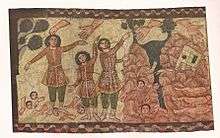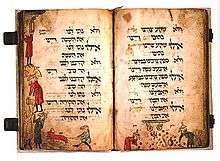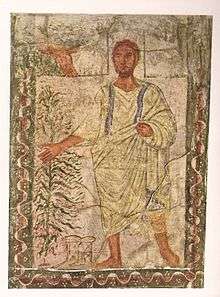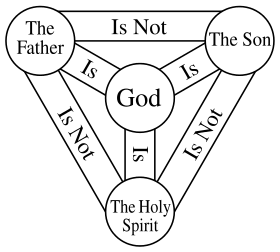Holy Spirit
Holy Spirit is a term found in English translations of the Bible that is understood differently among the Abrahamic religions.[1][2] The term is also used to describe aspects of other religions and belief structures.
Etymology
The word "Spirit" (from the Latin spiritus meaning "breath") appears as either alone or with other words, in the Hebrew Bible (Old Testament) and the New Testament. Combinations include expressions such as the "Holy Spirit", "Spirit of God", and in Christianity, "Spirit of Christ".[3]
The word Spirit is rendered as רוּחַ (ruach) in Hebrew-language parts of the Old Testament.[4] In its Aramaic parts, the term is rûacḥ.[5] The Greek translation of the Old Testament, the Septuagint, translates the word as πνεῦμα (pneuma).[4] This is the same word that is used throughout the New Testament, written originally in Greek.[6]
The English term "Spirit" comes from its Latin origin, spiritus, which is how the Vulgate translates both the Old and New Testament concept.[7] The alternative term, "Holy Ghost", comes from Old English translations of spiritus.[8]
Comparative religion
The Hebrew Bible contains the term "Spirit of God" (ruach hakodesh) in the sense of the might of a unitary God. This meaning is different from the Christian concept of "Holy Spirit" as one personality of God in the Trinity.[9]
The Christian concept tends to emphasize the moral aspect of the Holy Spirit more than Judaism, evident in the epithet Holy Spirit that appeared in Jewish religious writings only relatively late but was a common expression in the Christian New Testament.[10]
According to theologian Rudolf Bultmann, there are two ways to think about the Holy Spirit: "animistic" and "dynamistic". In animistic thinking, it is "an independent agent, a personal power which like a demon can fall upon a man and take possession of him, enabling him or compelling him to perform manifestations of power" while in dynamistic thought it "appears as an impersonal force which fills a man like a fluid".[11] Both kinds of thought appear in Jewish and Christian scripture, but animistic is more typical of the Old Testament whereas dynamistic is more common in the New Testament.[12] The distinction coincides with the Holy Spirit as either a temporary or permanent gift. In the Old Testament and Jewish thought, it is primarily temporary with a specific situation or task in mind, whereas in the Christian concept the gift resides in man permanently.[13]
On the surface, the Holy Spirit appears to have an equivalent in non-Abrahamic Hellenistic mystery religions. These religions included a distinction between the Spirit and psyche, which is also seen in the Pauline epistles. According to proponents of the History of religions school, the Christian concept of the Holy Spirit cannot be explained from Jewish ideas alone without reference to the Hellenistic religions.[14] However, according to theologian Erik Konsmo, the views "are so dissimilar that the only legitimate connection one can make is with the Greek term πνεῦμα [pneuma, Spirit] itself".[15]
Another link with ancient Greek thought is the Stoic idea of the Spirit as anima mundi—or world soul—that unites all people.[15] Some believe that this can be seen in Paul's formulation of the concept of the Holy Spirit that unites Christians in Jesus Christ and love for one another, but Konsmo again thinks that this position is difficult to maintain.[16] In his Introduction to the 1964 book Meditations, the Anglican priest Maxwell Staniforth wrote:
Another Stoic concept which offered inspiration to the Church was that of 'divine Spirit'. Cleanthes, wishing to give more explicit meaning to Zeno's 'creative fire', had been the first to hit upon the term pneuma, or 'spirit', to describe it. Like fire, this intelligent 'spirit' was imagined as a tenuous substance akin to a current of air or breath, but essentially possessing the quality of warmth; it was immanent in the universe as God, and in man as the soul and life-giving principle. Clearly it is not a long step from this to the 'Holy Spirit' of Christian theology, the 'Lord and Giver of life', visibly manifested as tongues of fire at Pentecost and ever since associated – in the Christian as in the Stoic mind – with the ideas of vital fire and beneficient warmth.[17]
Abrahamic religions
Judaism
The Hebrew language phrase ruach ha-kodesh (Hebrew: רוח הקודש, "holy spirit" also transliterated ruacḥ ha-qodesh) is a term used in the Hebrew Bible (Tanakh) and Jewish writings to refer to the spirit of YHWH (רוח יהוה). It literally means "spirit of the holiness" or "spirit of the holy place". The Hebrew terms ruacḥ qodshəka, "thy holy spirit" (רוּחַ קָדְשְׁךָ), and ruacḥ qodshō, "his holy spirit" (רוּחַ קָדְשׁוֹ) also occur (when a possessive suffix is added the definite article is dropped).
The "Holy Spirit" in Judaism generally refers to the divine aspect of prophecy and wisdom. It also refers to the divine force, quality, and influence of the Most High God, over the universe or over his creatures, in given contexts.[18]
 Ezekiel receives divine command, represented by the Hand of God, Dura-Europos Synagogue, 3rd century CE
Ezekiel receives divine command, represented by the Hand of God, Dura-Europos Synagogue, 3rd century CE Early 14th-century Birds' Head Haggadah: two hands of God appear underneath the text of the Dayenu song, dispensing the manna from heaven[19]
Early 14th-century Birds' Head Haggadah: two hands of God appear underneath the text of the Dayenu song, dispensing the manna from heaven[19]
Christianity
For the large majority of Christians, the Holy Spirit (or Holy Ghost, from Old English gast, "spirit") is a member of the Trinity: The "Triune God" manifested as Father, Son, and Holy Spirit; each aspect itself being God.[20][21][22] Two symbols from the New Testament canon are associated with the Holy Spirit in Christian iconography: a winged dove, and tongues of fire.[23][24] Each depiction of the Holy Spirit arose from different historical accounts in the Gospel narratives; the first being at the baptism of Jesus in the Jordan River where the Holy Spirit was said to descend in the form of a dove as the voice of God the Father spoke as described in Matthew, Mark, and Luke[25];the second being from the day of Pentecost, fifty days after Pascha where the descent of the Holy Spirit came upon the Apostles and other followers of Jesus Christ, as tongues of fire as described in the Acts of the Apostles.2:1–31[26] Called "the unveiled epiphany of God",[27] the Holy Spirit is the one who empowers the followers of Jesus with spiritual gifts[28][29] and power[30][31] that enabled the proclamation of Jesus Christ, and the power that brought conviction of faith.
.jpg) Depiction of the Christian Holy Spirit as a dove, by Gian Lorenzo Bernini, in the apse of Saint Peter's Basilica
Depiction of the Christian Holy Spirit as a dove, by Gian Lorenzo Bernini, in the apse of Saint Peter's Basilica A depiction of the Trinity consisting of God the Holy Spirit along with God the Father and God the Son
A depiction of the Trinity consisting of God the Holy Spirit along with God the Father and God the Son- Pentecost icon depicting the descent of the Holy Spirit upon the Apostles and Mary in the form of tongues of flame above their heads.
Islam
The Holy Spirit (Arabic: روح القدس Ruh al-Qudus, "the holy spirit") is mentioned four times in the Qur'an,[32] where it acts as an agent of divine action or communication. While there are similarities to the Holy Spirit mentioned in Christian and Jewish, it is unclear if these four references[33] refer to the same Holy Spirit. The Muslim interpretation of the Holy Spirit is generally consistent with other interpretations based upon the Old and the New Testaments. On the basis of narrations in certain Hadith some Muslims identify it with the angel Gabriel (Arabic Jibrāʾīl). The Spirit (الروح al-Ruh, without the adjective "holy" or "exalted") is described, among other things, as the creative spirit from God by which God enlivened Adam, and which inspired in various ways God's messengers and prophets, including Jesus and Abraham. The belief in a "Holy Trinity", according to the Qur'an, is forbidden and deemed to be blasphemy. The same prohibition applies to any idea of the duality of God (Allah).[34][35]
Other religions
Other religions reference a spirit that has a name resembling the Holy Spirit found in the Christian and Jewish faiths, but similar to Islam, this is a different spirit with a different purpose that is unique to those religions, as is seen below:
Bahá'í Faith
The Bahá'í Faith has the concept of the Most Great Spirit, seen as the bounty of God.[36] It is usually used to describe the descent of the Spirit of God upon the messengers/prophets of God who include, among others, Jesus, Muhammad and Bahá'u'lláh.[37]
In Bahá'í belief, the Holy Spirit is the conduit through which the wisdom of God becomes directly associated with his messenger, and it has been described variously in different religions such as the burning bush to Moses, the sacred fire to Zoroaster, the dove to Jesus, the angel Gabriel to Muhammad, and the Maid of Heaven to Bahá'u'lláh.[38] The Bahá'í view rejects the idea that the Holy Spirit is a partner to God in the Godhead, but rather is the pure essence of God's attributes.[39]
Hinduism
The Hinduism concept of Advaita is linked to Trinity and has been briefly explained by Raimon Panikkar, Professor of Comparative Religion and History of Religions, Department of Religious Studies of the University of California. He states that the Holy Spirit, as one of the Three Persons of the Trinity of "father, Logos and Holy Spirit", is a bridge builder between Christianity and Hinduism. He explains that “The meeting of spiritualistic can take place in the Spirit. No new 'system' has primarily to come of this encounter, but a new and yet old spirit must emerges."[40] In North India, Indian Christians have associated the Hindu term Atman with the Holy Spirit. Atman is Vedic terminology elaborated in Hindu scriptures such as Upanishads and Vedanta signifies the Ultimate Reality and Absolute.[41]
Buddhism
In Buddhism, Holy Spirit is compared to Buddha Nature as a Buddhist image or Christ consciousness, a oneness with an all encompassing plan. Hence, the Holy Spirit is considered the "means of which the faithful develop and journey to their spiritual goal."[42]
Sikhism
In Sikhism, the Guru is the medium and the Holy spirit is stated to have moved from Guru Nanak to the nine Sikh Gurus who followed him culminating with Guru Gobind Singh, the "tenth Guru Nanak".[43]
Zoroastrianism
In Zoroastrianism, the Holy Spirit, also known as Spenta Mainyu, is a hypostasis of Ahura Mazda, the supreme Creator God of Zoroastrianism; the Holy Spirit is seen as the source of all goodness in the universe, the spark of all life within humanity, and is the ultimate guide for humanity to righteousness and communion with God. The Holy Spirit is put in direct opposition to its eternal dual counterpart, Angra Mainyu, who is the source of all wickedness and who leads humanity astray.[44][45]
See also
References
- ↑ Levison, John R. (2002). The Spirit in First-Century Judaism. Boston: Brill. p. 65. ISBN 0-391-04131-2.
Relevant Milieux : Israelite Literature : The expression, holy spirit, occurs in the Hebrew Bible only in Isa 63:10–11 and Ps 51:13. In Isaiah 63, the spirit acts within the corporate experience of Israel...
- ↑ Caner, Emir Fethi; Caner, Ergun Mehmet (2003). More Than a Prophet: An Insider's Response to Muslim Beliefs about Jesus and Christianity. Grand Rapids, MI: Kregel Publications. p. 43. ISBN 978-0-8254-9682-0.
In Surah al-Nahl (16:102), the text is even more explicit: Say, the Holy Spirit has brought the revelation from thy Lord in Truth, in order to strengthen those who believe and as a Guide and glad tidings to Muslims."
- ↑ Bultmann 2007, p. 153.
- 1 2 Caulley, Thomas Scott (2001). "Holy Spirit". In Elwell, Walter A. Evangelical Dictionary of Theology. Grand Rapids: Baker Academic. p. 568. ISBN 978-1-4412-0030-3.
- ↑ Levison, John R. (2009). Filled with the Spirit. Grand Rapids: Wm. B. Eerdmans Publishing. p. 129. ISBN 978-0-8028-6372-0.
- ↑ Bultmann 2007, p. 154.
- ↑ Harper, Douglas. "spirit (n.)". Online Etymology Dictionary. Retrieved August 29, 2016.
- ↑ Harper, Douglas. "ghost (n.)". Online Etymology Dictionary. Retrieved August 29, 2016.
- ↑ Espín, Orlando O. (2007). "Holy Spirit". In Espín, Orlando O.; Nickoloff, James B. An Introductory Dictionary of Theology and Religious Studies. Collegeville: Liturgical Press. p. 576. ISBN 978-0-8146-5856-7.
- ↑ Dunn, James D. G. (2006). "Towards the Spirit of Christ: The Emergence of the Distinctive Features of Christian Pneumatology". In Welker, Michael. The Work of the Spirit: Pneumatology and Pentecostalism. Grand Rapids: Wm. B. Eerdmans Publishing. p. 3. ISBN 978-0-8028-0387-0.
- ↑ Bultmann 2007, p. 155.
- ↑ Bultmann 2007, pp. 156–157.
- ↑ Bultmann 2007, pp. 157.
- ↑ Konsmo 2010, p. 2.
- 1 2 Konsmo 2010, p. 5.
- ↑ Konsmo 2010, p. 6.
- ↑ Aurelius, Marcus (1964). Meditations. London: Penguin Books. p. 25. ISBN 0-14044140-9. ISBN 978-0-140-44140-6.
- ↑ Alan Unterman and Rivka Horowitz,Ruah ha-Kodesh, Encyclopedia Judaica (CD-ROM Edition, Jerusalem: Judaica Multimedia/Keter, 1997).
- ↑ The Birds' Head Haggadah. The Israel Museum Permanent Exhibitions.
- ↑ Erickson, Millard J. (1992). Introducing Christian Doctrine. Baker Book House. p. 103.
- ↑ Hammond, T. C. (1968). Wright, David F., ed. In Understanding be Men: A Handbook of Christian Doctrine (6th ed.). Inter-Varsity Press. pp. 54–56, 128–131.
- ↑ Grudem, Wayne A. (1994). Systematic Theology: An Introduction to Biblical Doctrine. Leicester, England: Inter-Varsity Press; Grand Rapids, MI: Zondervan. p. 226.
- ↑ Luke 3:22, NIV
- ↑ Acts 2:3, NIV
- ↑ Luke 3:22, NIV
- ↑ Williams, Charles (1950). The descent of the Dove : a short history of the Holy Spirit in the church. London: Faber.
- ↑ Kasemann, Ernst (1960). The Beginnings of Christian Theology [W.J. Montague, New Testament Questions of Today] (in German). 102: Philadelphia: Fortress. ISBN 978-1-316-61990-2.
- ↑ I Corinthians 13:4-11, NIV
- ↑ Wesley, John (2003). The Holy Spirit and power. Keefauver, Larry., Weakley, Clare G. ([Rev. and updated ed.] ed.). Gainesville, Fla.: Bridge-Logos. p. 107. ISBN 088270947X. OCLC 53143450.
- ↑ Acts 1:8
- ↑ Johnson, Bill. When Heaven Invades Earth. Destiny Image, 2005
- ↑ Qur'an search: روح القدس. searchtruth.com.
- ↑ Qur'an search: روح القدس. searchtruth.com.
- ↑ Griffith, Sidney H. Holy Spirit, Encyclopaedia of the Quran.
- ↑ Thomas Patrick Hughes, A Dictionary of Islam, p. 605.
- ↑ `Abdu'l-Bahá (1981) [1904–06]. "The Holy Spirit". Some Answered Questions. Wilmette, Illinois, USA: Bahá'í Publishing Trust. pp. 108–109. ISBN 0-87743-190-6.
- ↑ Taherzadeh, Adib (1976). The Revelation of Bahá'u'lláh, Volume 1: Baghdad 1853–63. Oxford, UK: George Ronald. p. 10. ISBN 0-85398-270-8.
- ↑ Abdo, Lil (1994). "Female Representations of the Holy Spirit in Bahá'í and Christian writings and their implications for gender roles". Bahá'í Studies Review. 4 (1).
- ↑ `Abdu'l-Bahá (1981) [1904–06]. "The Trinity". Some Answered Questions. Wilmette, Illinois, USA: Bahá'í Publishing Trust. pp. 113–115. ISBN 0-87743-190-6.
- ↑ Camilia Gangasingh MacPherson (1996). A Critical Reading of the Development of Raimon Panikkar's Thought on the Trinity. University Press of America. pp. 41–32. ISBN 978-0-7618-0184-9.
- ↑ Veli-Matti Kärkkäinen (2010). Holy Spirit and Salvation. Westminster John Knox Press. p. 431. ISBN 978-0-664-23136-1.
- ↑ Thomas Ragland (2003). The Noble Eightfold Path of Christ: Jesus Teaches the Dharma of Buddhism. Trafford Publishing. p. 107. ISBN 978-1-4120-0013-0.
- ↑ Kartar S. Duggal (1988). Philosophy and Faith of Sikhism. Himalayan Institute Press. p. 39. ISBN 978-0-89389-109-1.
- ↑ Mary Boyce (1990). Textual Sources for the Study of Zoroastrianism. University of Chicago Press. p. 12. ISBN 978-0-22606-930-2.
- ↑ Meena Iyer (2009). Faith and Philosophy of Zoroastrianism. Gyan Publishing House. p. 90. ISBN 978-8-17835-724-9.
Works cited
- Bultmann, Rudolf (2007) [1951]. Theology of the New Testament. 1. Translated by Grobel, Kendrick. Waco: Baylor University Press. § 14. The Spirit: 1. ISBN 978-1-932792-93-5.
- Konsmo, Erik (2010). The Pauline Metaphors of the Holy Spirit: The Intangible Spirit's Tangible Presence in the Life of the Christian. New York: Peter Lang. ISBN 978-1-4331-0691-0.
- Marcus Aurelius (1964). Meditations. London: Penguin Books. ISBN 0-14044140-9.